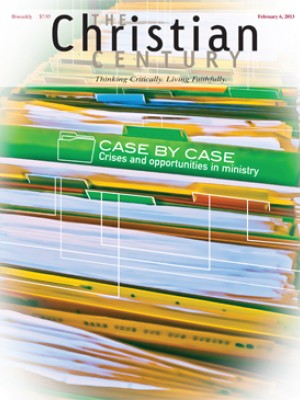Sunday, February 17, 2013 (Deuteronomy 26:1-11; Romans 10:8b-13; Luke 4:1-13)
Our Deuteronomy passage is set in the land of Moab, beyond the Jordan, maybe where Jesus went after his baptism and ordination. The 40 years in the wilderness are over, and the children of Israel have not yet been allowed into the Promised Land. Similarly, Jesus’ temptations came to him after he had fasted for 40 days and before he began his ministry of taking a new people into a new kingdom.
Moses is coming to the end of his speech. He is asking the people simultaneously to look forward and to look back—forward to the abundance that they will be receiving in the Promised Land and backward so that as receivers of abundance they will never rest on their laurels and think that their abundance is their due. Instead they will remember the great precariousness through which they have come—spiritual offspring of a precarious Aramaean and dependent on great generosity.
Read our latest issue or browse back issues.
How does the looking forward appear? It looks like celebrating abundance by offering its first fruit—not by ourselves, however, but alongside two partners who together act as pulls against our self-congratulation. They are the Levites, who are experts in worship, and the aliens, who have been put into positions of precariousness by a self-congratulatory ethos. Abundance is real, but it can really be enjoyed only if we are celebrating the source of abundance and only if there are no victims of our abundance.
All this is the role that Jesus is acting out in the wilderness. He learns to be the precarious one in the desert. But where Moses reassured his listeners with the little word when, as in “when you come into the land,” the devil comes to Jesus and thrice tempts him with the word if. If is the entry to privation, not abundance. “If you are . . .” is supposed to cause Jesus to doubt that he is the Son of God and feel the need to prove it. If is the trigger for me to foreclose, to grasp my identity before time, to settle for a fake identity rather than to wait for the identity that is mine already, but coming upon me, not available to be grasped. So Jesus, fully in line with Deuteronomy, which taught that the manna was a sort of nonbread that would teach the people to hunger appropriately, refers the devil to the sort of giving that is more real because it cannot be grasped. The living word that is at Deuteronomy’s core causes one to come to life by being able to live as a nongrasper. That is the sort of bread that Jesus will become for others by not grasping the possibility of producing bread now.
The devil tries a different if. Can he persuade Jesus to shortchange himself by becoming the principal dynamic of this world by authority and glory based on rivalry, prestige and death? “If you will worship me, it shall all be yours.” In his reply, again from Deuteronomy, Jesus refuses the if, for he knows that it will be given to him to be the principal dynamic of a new creation and kingdom, one that will undo all the passing glories of the kingdoms. This is in any case his inheritance —all his, no “ifs” about it—and it will be given to him as he walks in power into the place of exclusion and marginalization, a power entirely beyond the satanic imagination.
For the final if, the devil tries to lure Jesus into premature expiation. At the beginning of the rite of atonement, a priest would announce the feast with a trumpet. The devil, with a beautiful psalm as his snare, tries to get Jesus to foreclose the atonement prematurely, to mimic, with a terrible and suicidal display of self-importance, the proper self-giving up to death of the one true Priest. Once again Jesus quotes Deuteronomy. There will be no rushing God into being God. Jesus will be given slowly to be the one true Priest, the one true sacrifice and the one true victim for all humans, without even the self-importance and impatience that tripped up Moses at the last.
By undergoing all this with his imagination focused firmly on the abundance that is coming toward him, Jesus not only obeys the living word; he instantiates it, so that he is the Living Word promised by Deuteronomy. It is the new density of this Living Word that has excited Paul in our verses from Romans. It is an abundance of God’s vivaciousness that knows not death which has allowed Jesus to walk in the midst of death, of fear and of scarcity: this is the abundance that raised Jesus from death.
When we perceive that abundance is no longer driven by scarcity, fear and if and when we know ourselves loved, we become lovable. Becoming lovable, we do not fear recognizing in public the power of one who walked for us in deep dark places. Not being self-important about being counted among the transgressors, we find that we can be saved.





